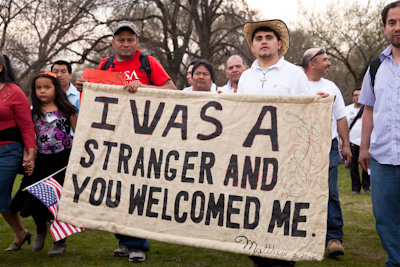How Churches are Ministering to Immigrants
The Bible is pretty clear about the church’s responsibility to “strangers.” Recent research in Toronto reveals how—and why—churches are developing new ministries to recent arrivals in Canada.
Did you know? More than 70% of Toronto residents were either born in a different country, or have at  least one parent who was born outside of Canada? And, more relevant to readers of good idea!, how do Canadian churches relate to immigrants? Earlier in 2014, we decided to find out.
least one parent who was born outside of Canada? And, more relevant to readers of good idea!, how do Canadian churches relate to immigrants? Earlier in 2014, we decided to find out.
We conducted four focus groups made up of leaders of ministries serving immigrants, foreign workers, refugees and international students in the GTA. Seventeen different individuals (nine women and eight men) from at least ten different denominations, representing at least nine different ethnicities, shared what they are doing and learning in their efforts to help immigrants and refugees setting and integrate into Canadian society.
Our research was inspired in part by the Beyond the Welcome national research project, which investigated how Canadian congregations are integrating new immigrants into the life of the worshipping community. (For more details, see http://ureachtoronto.com/content/beyond-welcome-how-canadian-churches-are-responding-canadas-immigrant-reality).
Although our research was Toronto-based, it is actually part of a larger, ecumenical research project covering the whole country facilitated by the Centre for Community Based Research (see http://www.communitybasedresearch.ca/Page/View/PDG) in cooperation with Crandall University, Trinity Western University, Christian Direction, Canadian Council of Churches, Evangelical Fellowship of Canada and the Tyndale Intercultural Ministry Centre.
We were not interested so much in statistics as in ideas: Why exactly are churches working among immigrants and refugees? What is their vision? Where did it come from? Who is driving it? The answers were surprising. Three things in particular stood out:
Personal experience of immigration
Many of the respondents had themselves been immigrants and refugees. Several of the churches represented in the study actually saw themselves as “immigrant churches.” This was a strong motivator to help those who found themselves in similar situations of need.
Teachings of the Bible
Different Biblical themes motivated this kind of ministry. For some, it was scriptures which speak of the believer’s responsibility to migrants (the “sojourners” of the Old Testament, for example). For others, it was the mandate to spread the Gospel and make disciples.
Some expressed a concern that these two motivations be clearly separate—for instance, that it should be perfectly clear what a meeting would be about, so that nobody felt manipulated, or that their weakness was being taken advantage of. All stressed that seeking to live lives of service would be the most powerful thing to commend Christian faith to newcomers.
Meeting a need
Common to all was the simple perception that here was a need that required a response. People and churches did not necessarily set out with the objective of helping newcomers settle and integrate. Rather, the concern arose simply because of changes people observed in their communities, and needs became obvious among the people they were meeting. It might be an international student who spoke wistfully of home and his mother’s cooking but is intrigued by what turkey might taste like at Thanksgiving. It could be a family that just arrived in the country who need help finding a doctor for their children and knowing how to get bus passes. It may be a Filipina nanny who is feeling lonely and is interested in conversation. Such were the things that sparked a response.
The focus groups also discussed what churches and individuals were actually doing. Friendship between individuals and between families was a commonly recurring theme. Participants talked with obvious pleasure about developing long-term relationships, of eating together, and of getting to know one another in each other’s homes. Friendships like this—not just programs—were mentioned as being key to how effective churches are in helping newcomers settle and integrate.
These relationships naturally led to churches and individuals offering practical help in a myriad of ways: finding furniture for a new apartment, giving rides to appointments, helping newcomers understand the transit system, helping search for housing or a job, and (not least) helping negotiate Canada’s refugee legislation. These churches worked wherever there was a need—with students, families, children, and caregivers. And they cared without discriminating among ethnicities, cultures, languages or religions. But all of these flowed out of personal relationships between individuals and families, which were clearly the primary factor in the ability of churches to help newcomers settle and integrate.
What might this mean for your church? Involvement begins very simply, with the basic Christian commitment to love our neighbours as ourselves. One way that expresses itself is by befriending people we meet, and listening to their stories. And that in turn can lead to understanding the specific challenges and practical needs faced by immigrants and refugees. Secondly, we can be encouraged that many of the ministries we heard about started off not with a grandiose plan and major funding but in small responses to the needs of someone who was, or became, a friend. Understanding the needs of newcomers then provided the motivation to find out what resources were available in the local community. Congregations subsequently decided what action they could take—and a ministry grew, and was blessed.
Mark D. Chapman is Assistant Professor of Research Methods at Tyndale University College & Seminary in Toronto
James Watson is a consultant for Church Planting and Congregational Revitalization for The Salvation Army in Canada and Bermuda. He is also chair of UReachToronto.com.
Research Assistants on this project were: Andrea Chang, Nelson Chang
Other Research Team Members were: Steven Jung, Ivana Mendez Piscione, Carmen Wong, Robert Cousins
For further reading: Heisz, Andrew. 2006. “Canada’s global cities: Socio-economic conditions in Montréal, Toronto and Vancouver.” Trends and conditions in census metropolitan areas. Ottawa: Statistics Canada. Janzen, Rich, Mark D. Chapman and James W. Watson. 2012. “Integrating Immigrants into the Life of Canadian Urban Christian Congregations: Findings from a National Survey.” Review of Religious Research 53: 441-470. Ley, David. 2008. “The Immigrant Church as an Urban Service Hub.” Urban Studies 45, no. 10: 2057-2074. For information on GTA resources, see: www.UReachToronto.com.
For updates on the national research project, see: http://www.communitybasedresearch.ca/Page/View/Get_Involved.


